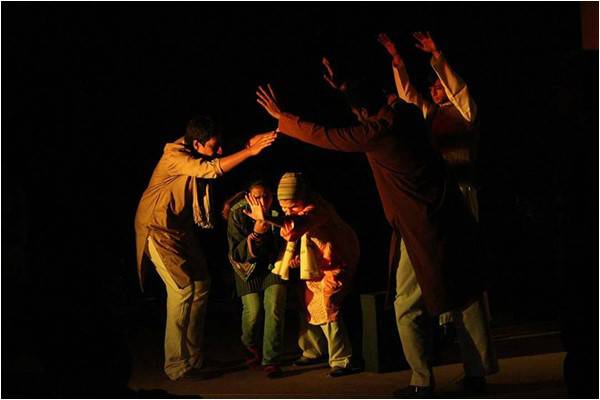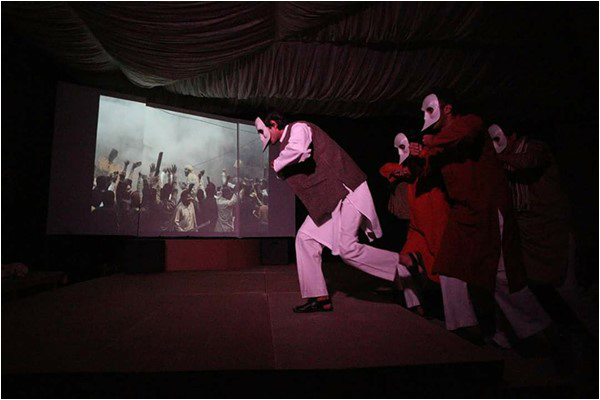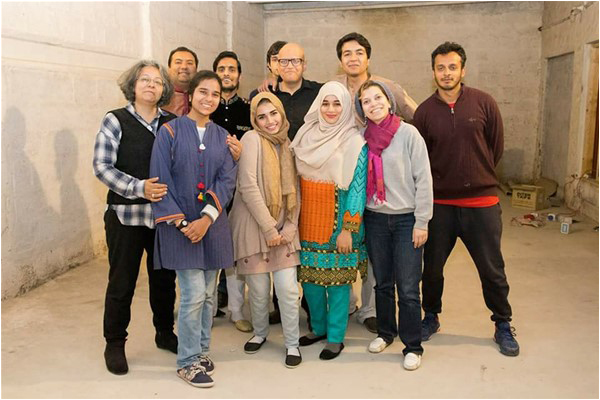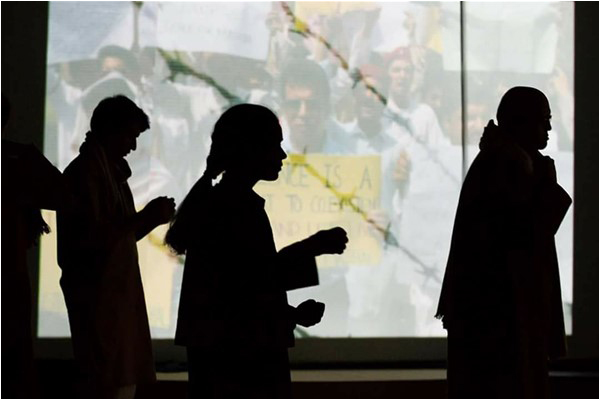
The beats of the tabla synced with the sitar mesmerise the audience. Irfan Masih and Wajih Nizami are master musicians; soon the audience is engrossed in their 15-minute performance, having forgotten all about their phones and worries. The high is broken by the sounds of sirens, blasts and gunshots on stage. Enter five men who carry out various acts of violence and the stage blacks out.
This is just the beginning of the play Zard Paton Ka Ban (ZPKB), an original play by an Islamabad-based theatre group active since 2005, The Theatre Wallay.
The play, which runs for almost two hours, captures its audience with its timing and well-thought-out, subtle reality checks.

The first run, which opened to three housefuls, ended in Islamabad in January and they are now heading to Karachi. The success of the play was unpredictable as the format is relatively new for local audiences.
“I knew that it was a solid play. Also it was very new for Islamabad. There is always a hint of doubt before a play actually happens as to how it will be received. We had done our work but you can never predict an audience’s reaction,” says Fizza Hasan, Artistic Director of Theatre Wallay, taking about the success of the play.
Presented in short episodes, ZPKB touches contentious topics which at a time of heightened political, social and religious sensitivity – and growing intolerance towards diversity – are not discussed openly. It explores the mindset of Pakistanis, making Islamabad its focus city. And it emphasises the need to reclaim public spaces intended for learning, leisure and worship. It depicts how ordinary lives have been altered due to the constant fear of terrorist attacks, rapid development and new lifestyles. These things are changing people’s relationships with their public spaces – knowingly or unknowingly.

“Economic considerations and shifting priorities are killing off cultural spaces which are perhaps the best means to combat fear, terror and division, and to build tolerance and bring people together in a climate of mutual respect and understanding through creative and artistic expression,” says Fizza Hasan, Artistic Director of Theatre Wallay.
The play also discusses the realities of women in this society. A skit is also dedicated to the APS horror, which brought tears to the eyes of the audience. That attack changed the dynamic of education in our country, introducing a new element of fear and a need for massive security. The play highlights the fact that we still haven’t recovered from it.
The cast is, undoubtedly, the soul of the play. Ammar Khalid and Fizza Hasan are the backbones of the play, who display the slightest of emotions with the most vigour. Razia Abrar holds the play together with her enchanting voice. Umer Khan and Shahzaib Wahlah give the play the youthful touch it needs. Rabia Pasha and Imran Iftikhar are the mood-changers of the play: their grasp of the art is such that they can take over your emotions before you even know it.

ZPKB presents multiple points of views and reflections about life in Pakistan for the ordinary person. Every dialogue, character and event is taken from the daily life of a Pakistani – making it supremely relatable. The performance is skilfully integrated with projections, live music and effective lighting which enhances the storytelling experience – Kazim Hussain is the one to thank for that technical mastery.
The play ZPKB was originally performed in English for an American audience which is not very familiar with life in Pakistan, at the Oregon Shakespeare Festival (OSF) and Artists Repertory Theatre, Portland. In fact, Theatre Wallay is the first Pakistani group to perform at OSF and Artists’ Rep.
Even though the audiences anticipated in Karachi and then Lahore are different from those in Islamabad, Fizza observes: “The issues that the play brings up are universal and very relevant to Karachi and Lahore.” She explains that the play focuses on Islamabad primarily because the team is from there.
“I hope the play generates the same kind of dialogue and discussion as it did in Islamabad” she says.
The play will open at the Pakistan American Cultural Council in Karachi from 6 - 8 April 2018. After that, the team plans to lead workshops for college and university student groups, teaching them scriptwriting and acting and encouraging them to prepare their own performances.
This is just the beginning of the play Zard Paton Ka Ban (ZPKB), an original play by an Islamabad-based theatre group active since 2005, The Theatre Wallay.
The play, which runs for almost two hours, captures its audience with its timing and well-thought-out, subtle reality checks.

The first run, which opened to three housefuls, ended in Islamabad in January and they are now heading to Karachi. The success of the play was unpredictable as the format is relatively new for local audiences.
“I knew that it was a solid play. Also it was very new for Islamabad. There is always a hint of doubt before a play actually happens as to how it will be received. We had done our work but you can never predict an audience’s reaction,” says Fizza Hasan, Artistic Director of Theatre Wallay, taking about the success of the play.
Presented in short episodes, ZPKB touches contentious topics which at a time of heightened political, social and religious sensitivity – and growing intolerance towards diversity – are not discussed openly. It explores the mindset of Pakistanis, making Islamabad its focus city. And it emphasises the need to reclaim public spaces intended for learning, leisure and worship. It depicts how ordinary lives have been altered due to the constant fear of terrorist attacks, rapid development and new lifestyles. These things are changing people’s relationships with their public spaces – knowingly or unknowingly.

“Economic considerations and shifting priorities are killing off cultural spaces which are perhaps the best means to combat fear, terror and division, and to build tolerance and bring people together in a climate of mutual respect and understanding through creative and artistic expression,” says Fizza Hasan, Artistic Director of Theatre Wallay.
The play also discusses the realities of women in this society. A skit is also dedicated to the APS horror, which brought tears to the eyes of the audience. That attack changed the dynamic of education in our country, introducing a new element of fear and a need for massive security. The play highlights the fact that we still haven’t recovered from it.
The cast is, undoubtedly, the soul of the play. Ammar Khalid and Fizza Hasan are the backbones of the play, who display the slightest of emotions with the most vigour. Razia Abrar holds the play together with her enchanting voice. Umer Khan and Shahzaib Wahlah give the play the youthful touch it needs. Rabia Pasha and Imran Iftikhar are the mood-changers of the play: their grasp of the art is such that they can take over your emotions before you even know it.

ZPKB presents multiple points of views and reflections about life in Pakistan for the ordinary person. Every dialogue, character and event is taken from the daily life of a Pakistani – making it supremely relatable. The performance is skilfully integrated with projections, live music and effective lighting which enhances the storytelling experience – Kazim Hussain is the one to thank for that technical mastery.
The play ZPKB was originally performed in English for an American audience which is not very familiar with life in Pakistan, at the Oregon Shakespeare Festival (OSF) and Artists Repertory Theatre, Portland. In fact, Theatre Wallay is the first Pakistani group to perform at OSF and Artists’ Rep.
Even though the audiences anticipated in Karachi and then Lahore are different from those in Islamabad, Fizza observes: “The issues that the play brings up are universal and very relevant to Karachi and Lahore.” She explains that the play focuses on Islamabad primarily because the team is from there.
“I hope the play generates the same kind of dialogue and discussion as it did in Islamabad” she says.
The play will open at the Pakistan American Cultural Council in Karachi from 6 - 8 April 2018. After that, the team plans to lead workshops for college and university student groups, teaching them scriptwriting and acting and encouraging them to prepare their own performances.

